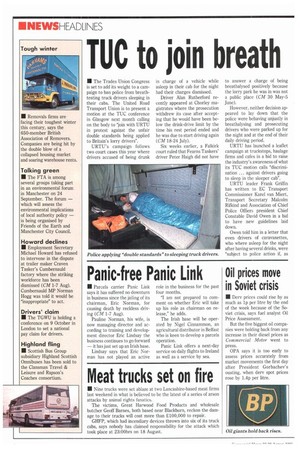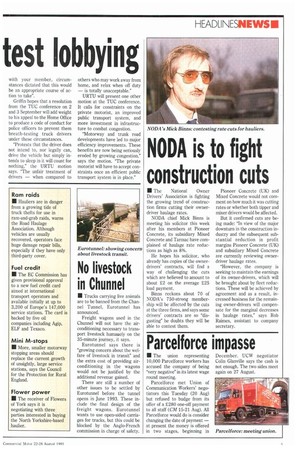TUC to join breath test lobbying
Page 6

Page 7

If you've noticed an error in this article please click here to report it so we can fix it.
• The Trades Union Congress is set to add its weight to a campaign to ban police from breathtesting truck drivers sleeping in their cabs. The United Road Transport Union is to present a motion at the TUC conference in Glasgow next month calling on the body to "join with URTU in protest against the unfair double standards being applied to Britain's lorry drivers".
URTU's campaign follows two court cases this year where drivers accused of being drunk in charge of a vehicle while asleep in their cab for the night had their charges dismissed.
Driver Alan Rutherford recently appeared at Chorley magistrates where the prosecution withdrew its case after accepting that he would have been below the drink-drive limit by the time his rest period ended and he was due to start driving again (CM 18-24 July).
Six weeks earlier, a Falkirk court ruled that Fearns Tankers' driver Peter Haigh did not have to answer a charge of being breathalysed positively because the lorry park he was in was not a public place (CM 30 May-5 June).
However, neither decision appeared to lay down that the police were behaving unjustly in breathalysing and prosecuting drivers who were parked up for the night and at the end of their daily driving period.
URTU has launched a leaflet campaign at truckstops, haulage firms and cafes in a bid to raise the industry's awareness of what its TUC motion calls "discrimi nation against drivers going to sleep in the sleeper cab".
URTU leader Frank Griffin has written to EC Transport Commissioner Karel van Miert, Transport Secretary Malcolm Rifkind and Association of Chief Police Offiers president Chief Constable David Owen in a bid to have new guidelines laid down.
Owen told him in a letter that even drivers of caravanettes, who where asleep for the night after having several drinks, were "subject to police action if, as with your member, circumstances dictated that this would be an appropriate course of action to take".
Griffin hopes that a resolution from the TUC conference on 2 and 3 September will add weight to his appeal to the Home Office to produce a code of conduct for police officers to prevent them breath-testing truck drivers under these circumstances.
"Protests that the driver does not intend to, nor legally can, drive the vehicle but simply intends to sleep in it will count for nothing," the URTU motion says. "The unfair treatment of drivers — when compared to others who may work away from home, and relax when off duty — is totally unacceptable."
URTU will present one other motion at the TUC conference. It calls for constraints on the private motorist, an improved public transport system, and more investment in infrastructure to combat congestion.
"Motorway and trunk road developments have led to major efficiency improvements. These benefits are now being seriously eroded by growing congestion," says the motion. "The private motorist will have to accept constraints once an efficient public transport system is in place."












































































